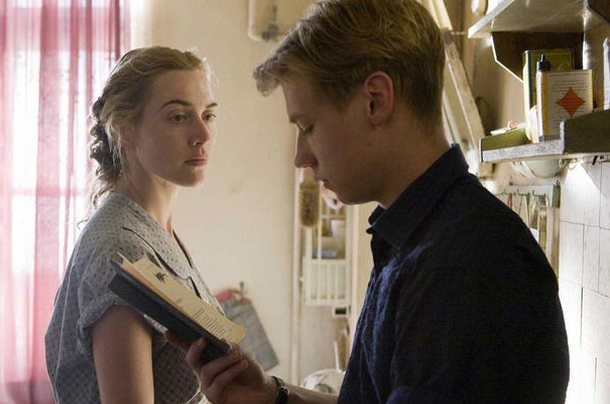2008.124 Minutes. Rated R
“It doesn’t matter what I feel. It doesn’t matter what I think. The dead are still dead.”

The Reader – The Weinstein Company
The Reader, originally a novel by Bernhard Schlink, takes place in post-war Germany. A young Michael Berg (David Kross) is stricken with Scarlet Fever. Helped off the tram and cared for by Hanna Schmitz (Kate Winslet), he returns weeks later to thank Hanna for her kindness. The awkward exchange in Hanna’s apartment leads to a summer-long sexual fling between the sixteen-year-old Michael and a much older Hanna. Their relationship grows stronger as Michael visits regularly to read books aloud to Hanna. Prompted by adolescent fantasies and a need for companionship, the bond between the two grows deeper and more curious. By the end of the summer, Hanna has inexplicably disappeared and Michael is left with more than awkward growing pains and a loneliness that catapults him into his studies. The relationship has left its mark on Michael’s psyche.
Michael enters law school a few years later. As part of a legal class that explores crimes of World War II as perpetrated by the Nazis, Michael and his colleagues are escorted to the courtroom for an unexpected confrontation. Female guards from a concentration camp are on trial for their role in the death of prisoners. A defendant is called to the stands, and Michael, in disbelief, is forced to recall the past, both personal and collective, as he looks for answers to questions that do not fit in the aftermath of earlier, misguided discoveries. Michael, like Germany, is forced to deal with secrets that have haunted him and to reconcile the past. As we learn in the courtroom, the movie is as much as about a loss of youth, as it is about identity and confrontation. Both Germany and Michael are on trial as they are forced to confront the demons of in ill-advised past, that only now offers a chance to be pieced together.
The Reader, despite its promise of rococo fantasies, belies a difficult course for blasting toward a post-modern absurdity where each of us is on trial in our own nightmare. On the surface, this is a movie about truth and reconciliation, brilliantly pieced together through the window of an older Michael Berg (Ralph Fiennes). We feel the loneliness and discomfort of Fiennes’ character as he recounts the events of his life. Michael looks back, trying to step into multiple worlds—a German history filled with atrocity; a sexual exploit that robbed him of his youth and innocence and left him vulnerable; the confrontation of growing pains in and out of the courtroom; and as a lawyer, a German, a man, and a father seeking relationships that are difficult to solidify. The viewer, voyeur and guilty witness, awkwardly look on and back with Michael, making sense of all that has unfolded.
One of the finest moments of the film comes at the end when the older Michael Berg visits a Jewish woman (a survivor) in New York City and proceeds to tell the never before spoken story of Hanna Schmitz. The story is awkward and marches slowly onto the viewer against a twentieth century of atrocities, the Jewish diaspora, and a collective unconscious seeking rationale and reconciliation. The woman is one of the only survivors of the concentration camp who testified at the trial. The woman asks “what does this have to do with me?” In some ways it is a rhetorical question. We answer it anyway, collectively, by pronouncing our simultaneous sympathy and shock at the exchange between Michael Berg and the Concentration Camp survivor. We know Berg was sleeping with the enemy. And while her pride and illiteracy (stupidity) did her in (think Germany), the details must be spoken, or read. The Reader is telling the story and we are more than witnesses to the story.
The Reader could be one of Kate Winslet’s best performances. She is at once sexy, somber, disruptive, honest, rough and delicate. Hanna Schmitz is as complex a character as any would-be criminal can be. The supporting cast might not be brilliant, but props to Winslet’s acting into a shining performance. Fiennes balances Winslet nicely as a bookend to a complex performance. This might not be a cinematic masterpiece, but it represents a challenging chapter in human history through the innocence of love and passion, and the guilty association of history and hatred. This is a movie that epitomizes the complexities of character. While we might recall the Suffering of Young Werther we are propelled into a new age of fragmentation and guilty association. As the direction of Stephen Daldry indicates, we are lonely prisoners of our own history. The Reader wags like a philosophical argument. We are looking for God, and Daldry suggests He might be in the mirror — horror of horrors! Give it a watch. This is a film that is not easily dismissed.
